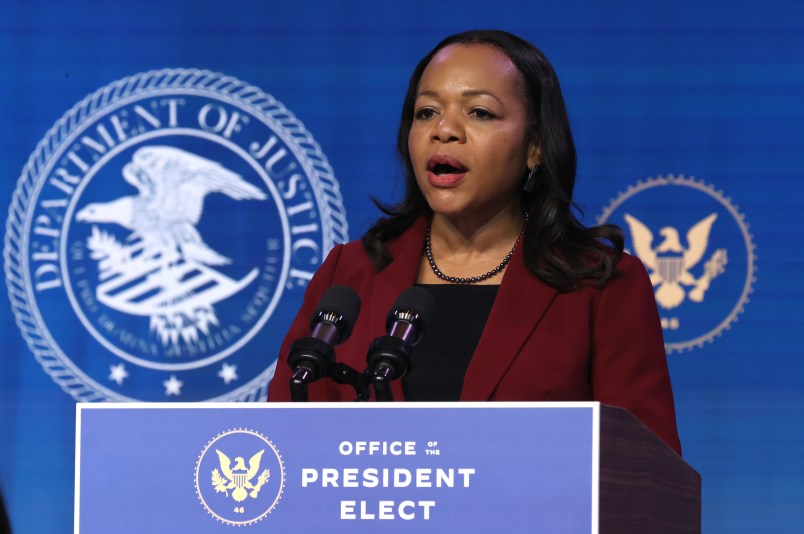In her confirmation hearing to head the civil rights division of President Biden’s Justice Department, Kristen Clarke faced intense questioning from Republican members of the Senate Justice Committee about her past criticisms of tough voting rules. Several GOP senators used the hearing to stake out their defense of the restrictive election measures sweeping across the nation — measures that are facing a backlash not just from Democrats and civil rights advocates, but from the business community that is usually aligned with the Republican Party.
Sen. Chuck Grassley (R-IA), the top Republican on the committee, signaled in his opening remarks GOP support of restrictive measures that supposedly “secure” elections.
He downplayed the threat of voter suppression by noting the historic turnout in the 2020 election. He said that it was fair game to question whether Clarke would view “efforts to secure our elections as voter suppression when she’s in charge of enforcing our voter laws.”
Clarke, a high-profile civil rights advocate, is the second controversial Biden Justice Department nominee to appear before the Senate panel. Last month, the committee considered the nomination of Vanita Gupta, who would serve as Clarke’s superior as the department’s associate attorney general if they are confirmed. While some of Gupta’s hearing touched on her voting rights work as civil rights attorney herself, much of the Republican ire at Gupta was trained on overhyped claims that she was an anti-cop radical.
Clarke faced similar allegations from Republicans, sensationalizing her stance on policing reform. But her views on voting rights played just as prominent a role at the hearing, as a debate over Georgia’s recent election rules overhaul and similar proposals elsewhere have come to dominate the national political discourse.
“I’m convinced you will be the lead warrior in that liberal agenda to destroy local election integrity,” Blackburn said. “I fear that you will use your power at the civil rights division to take away states’ rights — their constitutional duty — and federalize control of elections.”
Blackburn grilled Clarke on her views about voter ID laws and proof of citizenship requirements, with the senator pointing to a 2016 statement by Clarke that described those measures as a “bag of tricks to suppress Black votes.”
Clarke said Wednesday that voter ID laws should be analyzed on a case by case basis, while holding firm that in some states, those mandates could have a sharper impact on older voters or voters of color.
Blackburn cut Clarke off before she could respond to a comparison Blackburn tried to make between voter mandates and the ID requirements that some pharmacies impose in order to pick up prescriptions.
Earlier in the hearing, Sen. John Cornyn (R-TX) noted how the number of voters in Texas skyrocketed in the 2020 election and asked if voters of color had been suppressed there.
“I know that there was some litigation to address some of the barriers that people face during the pandemic,” Clarke said. “I think those numbers reflect an encouraging picture, at the end of the day, that reflects the results of advocacy, litigation and other efforts to make it easier for people to vote amid the deadly pandemic.”
She later mentioned the long lines during the Texas early voting period, and particularly during the spring primary as the pandemic was still beginning, to argue that “there’s still work to do.”
(Left unmentioned in Cornyn’s questioning is that Texas lawmakers are currently considering new limits on ballot access targeted at the large, urban counties that drove the 2020 turnout surge.)
Cornyn and other Republicans tried to trap Clarke with questions parroting oft-made Republican defenses of restrictive laws. They asked her whether it should be easy to vote but hard to cheat in elections, and whether she believed voter fraud was a “myth”, a term she once used to describe the bogus claims of mass fraud made by former President Trump.
Multiple Democrats, meanwhile, asked Clarke to elaborate on the DOJ civil rights division’s obligation to enforce federal voting laws including the Voting Rights Act. Some name-checked the recent restrictive voting law in Georgia in particular, while other Democrats noted that the 2013 Supreme Court decision gutting a key part of the VRA had opened up the floodgates for the current wave of the restrictive bills.
Legislation that would restore the invalidated section is expected to make its way through the House and will need the votes of 10 Republicans in the Senate to overcome a GOP filibuster.
In discussing the DOJ voting rights enforcement authority, Clarke said that she watched from within the Capitol when the Senate unanimously renewed the VRA in 2006. She noted that Cornyn and Grassley were among the Republican senators that gave the renewal its bipartisan support.
Clarke even managed to work in during Blackburn’s hostile questioning a similar line about the Tennessee senator, who was a House member during the 2006 renewal push.
“I view voting rights issues in a nonpartisan sense,” Clarke said. “And I thank you for being one of the 390 people who voted to reauthorize section five in 2006.”







Ummmmm, that constitutional duty isn’t exactly clear Senator Blackhead. Crawl back away from the sunlight now dear.
Constitution Check: Who decides who gets to vote?
I think the appropriate term here is ‘ZING!!!’
“…And then they came for me…”
There are lots of people who think that they are accepted by racists. They might want to think about the above.
Voting is a right of every American citizen and every one of those citizens should have equal access to that voting.
NONE of them actually understand how to talk about race.
In a sense, a dunderhead like Blackburn and her word-salad is a vast improvement for what’s coming, GOP style…
–Boxcars heading “East”–
The above is a metaphor for those who have no power…having been long ago stripped of what little they ever had, because of abominable racists like Blackburn. Power is not stripped in one fell swoop. It goes in increments.
Right Marsha?